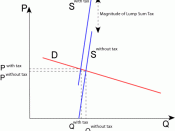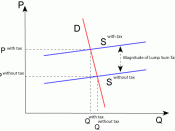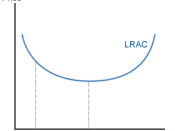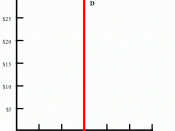ESSAY An increase in the price of oil will lead to an increase in the price of their subproducts such as petrol, diesel and heating oil. Because oil refineries want have the same profit so if their costs increase (oil is with a higher price) their product is going to be as well more expensive to have everything in order.
These products have an important role in our developing world so if their price varies it cause a big impact in our behaviour. Of course that the response of the demand of this products are different and it depends also in the type of user, so let's have a look to how might they response.
If we have the owner of a 4X4 that consumes large quantities of petrol. And he only uses for going to work possibly in presence of an increase in the price of petrol, he will tried to use less the car and probably use the bus all this in the short run. And in the long run if the increase persist he could buy a smaller car that consumes less petrol or maybe one with a diesel motor or even one with an alternative engine such as solar or electric one if these technologies evolve according to the circumstances. This guy's response is elastic and his use of petrol is not that vital so he could adjust easily to some varies in prices. But in the other hand we could have someone that have a small bus that carries children to school, if the price of petrol increase he still have to consume the same amount so his response is inelastic. Although in the short run his income will be reduce in the long run he could concentrate their clients in a small track or increase his tariff or buy a diesel vehicle.
With petrol the response is variable (at some point elastic) and you could still have some substitutes (bus, train), not always in the long run, but the average will say that the variation of demand is not that big. Always according to their income they can react in shorter or longer terms.
Diesel is an other story, because it is use mainly for trucks and heavy machinery. His need is always the same even when its price increase, because is a factor of production of a lot of industries. So an increase in price of it is assume, as an increase in costs of production but the response of it is almost perfect inelastic because you could optimised their use but not reduce it considerably. For example for a person that has a truck and he uses it to transport wood from the sawmill to the port, an increase in the price of diesel would affect his work. He could increase his tariff in the short run or reduce his income but never stop working. So his response is inelastic. In the long run he could add a trailer to have more capacity, but not big changes.
Heating oil is however the more affected with an increase in price because it has more substitutes such as gas, paraffin, etc. The response is more elastic, so the demand will decrease in the short run a little and considerably in the long run. Because a lot of persons will change their stoves for the ones that have a cheaper fuel. Also and important factor that affect the demand is the season when the increase will take in. Because if it occurs in summer season the demand will not varies in the short term, (no demand is taking part) and gives time to the users to change their equipment reducing dramatically the demand for it in winter. But if occur during winter until its end the demand will stay nearly the same and during the next season changes and adjustments will be make. Because heating oil is a necessity only when temperatures are low"æhaving considerable demand only in winter and from people of medium low and low incomes.
So when the price of petrol, diesel and heating oil increase the demand for this products aren't the same because petrol demand is inelastic in its average, although is the main fuel for transportation at some point this could change. The responses vary. Diesel response of the demand to an increase in price is nearly zero becoming almost perfect inelastic. Because is use for producing and working and its need is constant.
The price increase of the heating oil is in the limit of inelastic and elastic (presumably elastic) because it has many substitutes of the same price. But the chances of the users of this product of changing their equipment (stoves, etc) aren't big, because their incomes aren't very good and because its need is by seasons.
This suppose increase in the price of oil and of its subproducts are now taking part in our country causing a lot of trouble to national economy because firms budgets are fixed and if fuels increase their price less production is being done for the same costs. So strikes of bus and trucks drivers are being held and this damages the growth of the country. And because we don't have substitutes for this the response is inelastic making worse the situation. So at some point the earth is going to run out of oil and if we don't developed alternative energy producers the whole world is going to be paralysed. Because in our days we are oil-dependants so we adjust to vary in price of it with resignation for not having alternatives. This is just beginning"æ.






